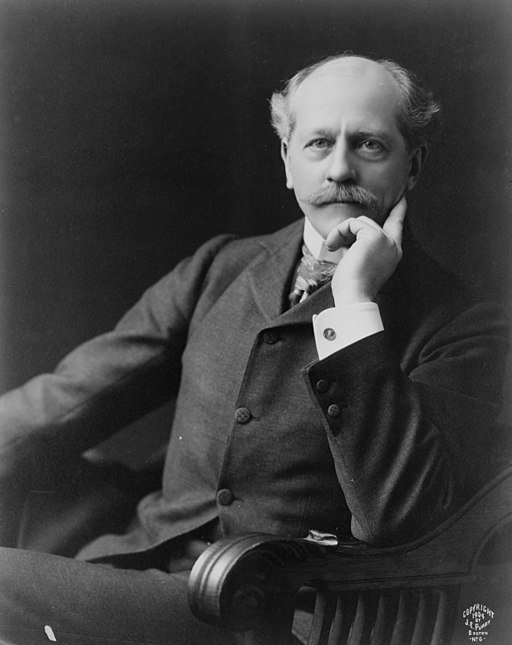Image: James E. Purdy / Public domain
When the first of America’s astronauts reaches the planet Mars-and one day they surely will- their first act should be to erect a statue to the memory and honor of Percival Lowell.
Carl Sagan, 1994
While the first American, or any other astronaut, is yet to reach Mars, the memory of Percival Lowell lives in the observatory he built, in the now-dwarf-planet Pluto that he was searching for (but didn’t live long enough to see it discovered) and in his theory about water canals on Mars built by intelligent martians.
To some, Percival Lowell was a brilliant mathematician, a self-taught astronomer and a planet science popularizer. To others, he was a dreamer, a crook, a wealthy amateur. No doubt that Lowell is one of the most recognizable and controversial figures of the beginning of 20th century Astronomy. This month we celebrate his 165th Birthday!
Percival Lowell (March 13, 1855 – November 12, 1916)
Lowell was born in 1855 to a wealthy upper class Bostonian family. His first encounter with Astronomy happened at the age of 3, when he saw the appearance of the comet Donati, “one of the most beautiful comets observed”. As a boy, Lowell attended “Nobles”, the famous prep school in Boston and, later, Harvard University. After graduation he worked in the family business, then studied Eastern culture and religion in Japan and Korea. It was not until Lowell was in his late thirties that he focused on Astronomy and telescopic observations.
Studies of Mars
Lowell was inspired by the work of the Italian astronomer Giovanni Schiaparelli, especially his studies of planet Mars. Schiaparelli reported discovering an intriguing network of lines on the Martian surface. He referred to them as “canali”, meaning “channels” in Italian. The term was mistranslated into English as “canals”, as in water canals built by the intelligent beings for irrigation. Lowell was convinced that Sciaparelli’s patterns were indeed canals and that Mars was inhabited. As the scientific community met the idea with skepticism, Lowell decided to build his own private observatory to study the Red Planet. He devoted more than a decade of his life to studying Mars and published several books about the Red Planet.
The Lowell Observatory
In 1894 Percival Lowell Founded an astronomical observatory in Fladstaff, Arizona, just south of the Grand Canyon, in an area that boasted a large number of clear nights. These days building an observatory in a place with the optimal atmospheric conditions is a common practice. Lowell is often credited as the first observer to do so.
Today Lowell Observatory operates five telescopes at three observing sites and employs around 100 staff, astronomers, technicians and educators. The Lowell scientists conduct research on a variety of topics, from small bodies in the Solar System, to planets around other stars. The observatory also has an excellent outreach program.
It is at Lowell Observatory that the Moon was mapped for the Apollo Program and the galactic redshift was discovered.
Search for planet X
Most people associate the name of Percival Lowell not with Mars, but with the now-dwarf-planet Pluto. Lowell was the first to propose the existence of a planet beyond the orbit of Neptune and, based on the irregularities in the positions of Uranus and Neptune, to calculate its possible orbit. He kept searching for the “Planet X” for 11 years, but didn’t live long enough to see his theory confirmed. Lowell passed away in 1916, fourteen years before Pluto was finally discovered- in Lowell Observatory and with a telescope funded by Percival’s brother- by the young astronomer Clyde Tombaugh.
I cannot help thinking just how enthusiastic Percival Lowell would have been to find out about our modern discoveries of other Pluto-like objects and about the ongoing search for the signs of past life on Mars. His ideas were not too far off, after all!
Visit our inflatable star dome to learn more about space, famous astronomers and space explorers. You will find the information about booking and the shows we offer on our website http://wonderdome.co.uk.

